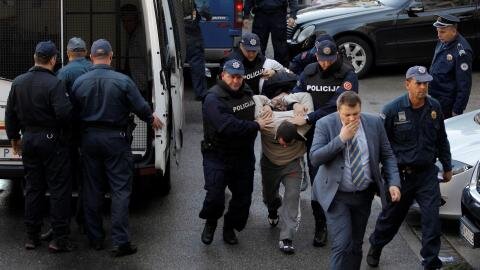Hawzah News Agency - Following Sunday’s shock victory which resulted in the long-serving president, Milo Djukanovic losing his grip on power after 30 years, the country's Muslim population is experiencing a backlash, according to local accounts.
In the town of Pljevlja, a few kilometres from the Serb border, members of the opposition celebrating the victory used the opportunity to vandalise Islamic premises and attack Muslim residents, a local news outlet reported.
A Muslim resident of the town, which has a sizeable Muslim population, said vandals holding the tricolour representing the Serb flag had stoned several properties owned by the Muslim community.
Pljevlja is a mainly Serbian town, and the actions of some opposition members have been described as harking back to dark days of the 1990s where a nationalist Serbia sought to brutally quash the Muslims of Bosnia and Kosovo in a bid to prevent them from establishing their own states.
The Democratic Front (DF), which is the largest opposition party, is also closely aligned with Serbia and Russia and is considered rightwing.
In Belgrade, the capital of Serbia, the victory by the opposition DF party was welcomed by numerous nationalist demonstrators who congregated outside parliament waving Serb and Montenegrin flags.
A Muslim resident of Pljevlja, Emir Pilav, said that Serb opposition nationalists were chanting "Turks, move from here".
Among Serb nationalists, the word Turk has pejorative connotations which is used to describe Muslims in general.
In the capital city of Montenegro, Podgorica, there were also reports of members of the opposition attacking people.
Some bystanders reported Serb nationalists were urinating and singing nationalists songs associated with genocide in the 1990s.
Greater Serbia
Some fear that Serb nationalist parties in Serbia and Montenegro are “the political infantry of Greater Serbia.”
In 2006, a referendum was held which passed by a narrow margin ending the State Union of Serbia and Montenegro.
As a result, Serbia became landlocked and it has been the dream of Serb nationalists to reunite the countries once again.
Background to the tensions
Milo Djukanovic has ruled Montenegro for almost 30 years and is one of the longest- serving politicians in Europe.
Formerly an ally of Serbian leader Slobodan Milosevic, Djukanovic is widely perceived to be pro-western, took the country into NATO and campaigned against the union in Serbia in a 2006 referendum.
Anti-corruption campaigners, however, have long had Djukanovic in their sights. In 2015 the Organized Crime and Corruption Reporting Project (OCCRP) accused him of building “one of the most dedicated kleptocracies and organized crime havens in the world."
The OCCRP even awarded Djukanovic the 2015 “Man of the year in organised crime and corruption” for “his work in creating an oppressive political atmosphere and an economy choked by corruption and money laundering, OCCRP honors Milo Djukanovic, Prime Minister of Montenegro, as OCCRP’s Person of the Year for his work in promoting crime, corruption and uncivil society.”
Over the last year, tensions have increased when an attempt to pass a bill on ‘Freedom of Religion or Beliefs’ was opposed by the Serbian Orthodox Church and pushed by the government of Milo Djukanovic.
The law would require the Serbian Orthodox Church, the largest religious body in the country, to prove its vast holding of lands. The issue led to weeks of unrest and protests
which resulted in the Serbian Orthodox Church accusing the government of attacking the church.
T


Your Comment